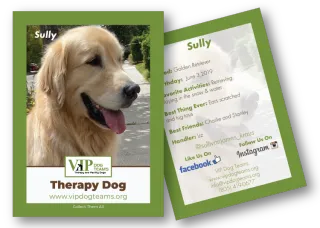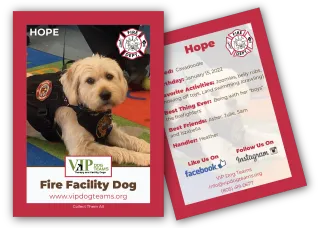VIP Dog Teams is a non-profit 501(c) (3). Our EIN#81-2995293.
Service, Therapy, Emotional Support:
What makes the training and work for each of these jobs different?
Take a detailed dive in the world of Certified Dog Training and learn what makes each working dog different.
Download our Guide to Dog Jobs PDF and get links to the answer you are looking for.
What is a Therapy Dog?
A Therapy Animal is a pet that is trained with its owner, as a team, to provide comfort and stress relief to others in a variety of situations. Community Meet and Greet Therapy dogs are usually the personal pets of their handlers. They work as a team with their handler (owner) to provide a variety of services to others. Certified Therapy dog teams volunteer in settings such as schools, hospitals, and senior homes. They provide comfort. Goal Oriented Therapy Dogs are a little different, they help achieve physical and educational goals. For example, working with a Physical therapist who has a client throwing a ball to a dog to increase mobility, or having children read aloud to a dog to improve their confidence and skills. This is what we would consider GOAL oriented therapy. The VIP Dog Teams Therapy Dog Program was designed from the beginning to only certify therapy dog teams in areas of underserved needs. Goal-oriented therapy is significantly different from the usual “meet and greet” hospital and senior home type of animal assisted activities. In the G.O.T. Dog (Goal Oriented Therapy Dog) program, the dogs are used both as a tool and a motivator to help clients (children and adults) achieve clearly defined goals as set by their therapist or teacher. At VIP Dog Teams, we will help you train your dog to become a certified therapy dog. We can also help you decide if you and your dog are a good fit for meet and greet therapy or Goal oriented therapy work. Therapy dogs are working dogs (dogs with jobs), but they are not Service Animals. Federal law does not legally define Therapy Dogs and they do not have any legal protection under the Americans with Disabilities Act of 1990 (ADA). To become a certified Therapy Dog, most organizations have evaluations the handler and dog must pass as a team. Certification typically includes insurance coverage, consistent visit and behavior guidelines, animal health assurances, and cleanliness standards. Federal law does not have a legal definition of a Therapy Dog. Additionally, federal law does not allow Therapy Dogs in public place that have “no pets” policies. Therapy Dogs are only allowed into facilities where they have been invited, or that are open to any pet. However, state laws may allow Therapy Dogs to travel on public transportation to and from scheduled therapy visits.

What breed of dog makes a great therapy dog?
The breed really doesn’t matter. It’s all about temperament. The best therapy dog is a dog who enjoys being pet and getting attention from everyone they meet. A dog who is indifferent to other dogs. He doesn’t need to like every dog he meets he just needs to not try to play or growl or bark at other dogs. A good therapy dog has had at least a few dog classes. If a dog has passed his Canine Good Citizen test (CGC) he is ready to train for therapy work. The dog is only half of the team. The person needs to be able to multitask, you need to carry on a conversation with others AND keep a close eye on your dog. If this sounds like something that is right for you and your dog check the class listing for the next available Therapy Prep Class and learn what it takes to become a therapy team.

What is a Facility Dog?
A Facility Dog, trained in obedience and specialty cues, is used in the work setting under the direction of the professional partner who has been trained in specific techniques which enable the dog to serve as a tool and a motivator, thus enhancing the accomplishment of client-related goals. The dog must be receptive to accepting leadership and direction from the trained handler, have the ability to maintain a calm and polite manner in all situations, and be adaptable to interact with a variety of people in different situations when given a command by the handler. Here’s a great article by Antonia Malchik titled “What if Schools Hired Dogs as Therapists?” This article explains how Facility Dogs help children hindered by rough backgrounds overcome learning issues in certain school subjects.

Service, Therapy, Emotional Support:
What makes the training and work for each of these jobs different?
Take a detailed dive in the world of Certified Dog Training and learn what makes each working dog different.
Download our Guide to Dog Jobs PDF and get links to the answer you are looking for.
What is a Therapy Dog?
A Therapy Animal is a pet that is trained with its owner, as a team, to provide comfort and stress relief to others in a variety of situations. Community Meet and Greet Therapy dogs are usually the personal pets of their handlers. They work as a team with their handler (owner) to provide a variety of services to others. Certified Therapy dog teams volunteer in settings such as schools, hospitals, and senior homes. They provide comfort. Goal Oriented Therapy Dogs are a little different, they help achieve physical and educational goals. For example, working with a Physical therapist who has a client throwing a ball to a dog to increase mobility, or having children read aloud to a dog to improve their confidence and skills. This is what we would consider GOAL oriented therapy. The VIP Dog Teams Therapy Dog Program was designed from the beginning to only certify therapy dog teams in areas of underserved needs. Goal-oriented therapy is significantly different from the usual “meet and greet” hospital and senior home type of animal assisted activities. In the G.O.T. Dog (Goal Oriented Therapy Dog) program, the dogs are used both as a tool and a motivator to help clients (children and adults) achieve clearly defined goals as set by their therapist or teacher. At VIP Dog Teams, we will help you train your dog to become a certified therapy dog. We can also help you decide if you and your dog are a good fit for meet and greet therapy or Goal oriented therapy work. Therapy dogs are working dogs (dogs with jobs), but they are not Service Animals. Federal law does not legally define Therapy Dogs and they do not have any legal protection under the Americans with Disabilities Act of 1990 (ADA). To become a certified Therapy Dog, most organizations have evaluations the handler and dog must pass as a team. Certification typically includes insurance coverage, consistent visit and behavior guidelines, animal health assurances, and cleanliness standards. Federal law does not have a legal definition of a Therapy Dog. Additionally, federal law does not allow Therapy Dogs in public place that have “no pets” policies. Therapy Dogs are only allowed into facilities where they have been invited, or that are open to any pet. However, state laws may allow Therapy Dogs to travel on public transportation to and from scheduled therapy visits.

What breed of dog makes a great therapy dog?
The breed really doesn’t matter. It’s all about temperament. The best therapy dog is a dog who enjoys being pet and getting attention from everyone they meet. A dog who is indifferent to other dogs. He doesn’t need to like every dog he meets he just needs to not try to play or growl or bark at other dogs. A good therapy dog has had at least a few dog classes. If a dog has passed his Canine Good Citizen test (CGC) he is ready to train for therapy work. The dog is only half of the team. The person needs to be able to multitask, you need to carry on a conversation with others AND keep a close eye on your dog. If this sounds like something that is right for you and your dog check the class listing for the next available Therapy Prep Class and learn what it takes to become a therapy team.

What is a Facility Dog?
A Facility Dog, trained in obedience and specialty cues, is used in the work setting under the direction of the professional partner who has been trained in specific techniques which enable the dog to serve as a tool and a motivator, thus enhancing the accomplishment of client-related goals. The dog must be receptive to accepting leadership and direction from the trained handler, have the ability to maintain a calm and polite manner in all situations, and be adaptable to interact with a variety of people in different situations when given a command by the handler. Here’s a great article by Antonia Malchik titled “What if Schools Hired Dogs as Therapists?” This article explains how Facility Dogs help children hindered by rough backgrounds overcome learning issues in certain school subjects.





